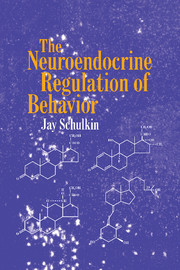Book contents
- Frontmatter
- Contents
- Acknowledgments
- Introduction
- 1 Hormones, Development, and Sexual Dimorphic Behaviors
- 2 Hormonal Regulation of Sodium and Water Ingestion
- 3 Hormonal Regulation of Food Selection
- 4 Hormones, Parental Care, and Attachment Behaviors
- 5 Hormonal Regulation of Fear and Stress
- 6 Hormones, Behavior, and Biological Clocks
- Conclusion
- References
- Name Index
- Subject Index
Conclusion
Published online by Cambridge University Press: 25 January 2011
- Frontmatter
- Contents
- Acknowledgments
- Introduction
- 1 Hormones, Development, and Sexual Dimorphic Behaviors
- 2 Hormonal Regulation of Sodium and Water Ingestion
- 3 Hormonal Regulation of Food Selection
- 4 Hormones, Parental Care, and Attachment Behaviors
- 5 Hormonal Regulation of Fear and Stress
- 6 Hormones, Behavior, and Biological Clocks
- Conclusion
- References
- Name Index
- Subject Index
Summary
A set of core concepts has organized the contents of this book, providing a perspective on the science of hormones, brain, and behavior. One of these is the notion that underlying many behaviors carried out by animals, including ourselves, are central motive states that are influenced by hormones acting on the brain (Lashley, 1938; Beach, 1942; Stellar, 1954). That is, hormones induce and sustain central states that prepare an animal to perceive the world in characteristic ways and then act accordingly.
Recall the Introduction: Hormonally facilitated central motive states can be divided into two phases. The first is the appetitive phase – searching for what is desired (e.g., sodium) and avoiding what is aversive (e.g., a predator). The second is the consummatory phase, in which the animal satisfies its desire (e.g., by ingesting sodium or by feeling safe). The organization of the behaviors is reflected in the functional roles that hormones play in the brain to generate behaviors that will maintain the internal milieu and respond to problems in the external world. Steroid and peptide hormones activate and sustain central motive states.
Herbert (1993) has produced a beautiful monograph depicting different contexts in which steroids and peptides interact to regulate behavior (see also Hoebel, 1988). Most of these have been discussed in this book. They range from ingesting food, water, and sodium to maternal behavior, fear, and aggression. Being economical, nature uses the same hormones to generate a variety of different central states.
- Type
- Chapter
- Information
- The Neuroendocrine Regulation of Behavior , pp. 214 - 226Publisher: Cambridge University PressPrint publication year: 1998



